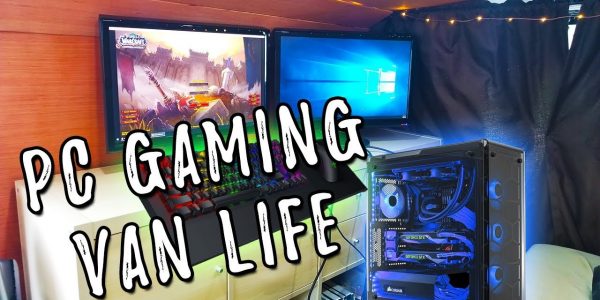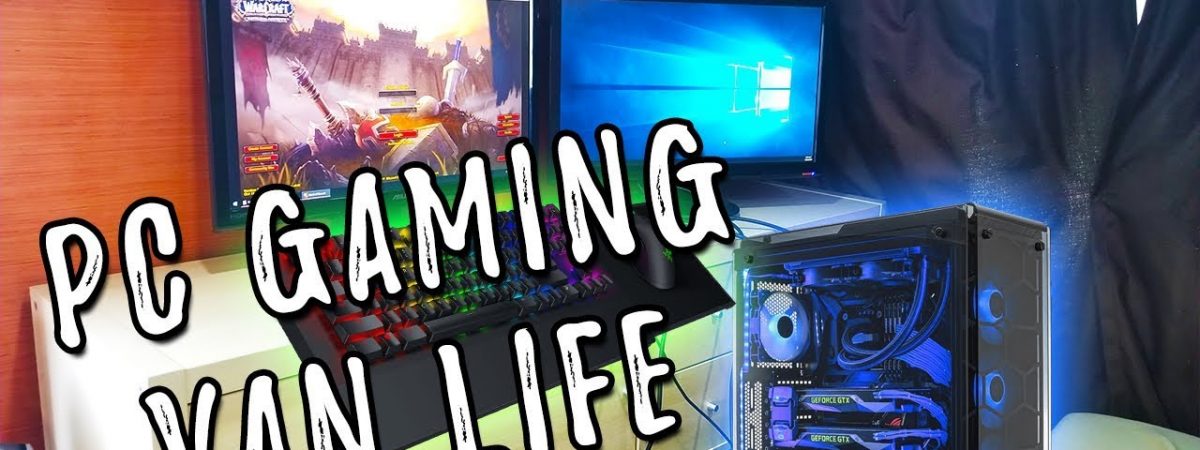Two of the coolest photos you’ll find online are scenic van life shots and glowing RGB gaming setups. Could it be possible to live on the road in a van without giving up your favorite games? One YouTuber has set out to answer that question using solar panels, a little bit of math and a compact gaming PC.
Van Life With Your Gaming Rig
Gamer and content creator Trent Arant, also known as @TTTHEFINEPRINTTT, lives out of a van, traveling the country and camping around incredible scenery. He’s doing something that inspires anxiety in many of us: traveling with a gaming PC without unplugging the GPU. Arant has figured out how to run his fully-fledged gaming setup entirely off solar power panels mounted on the roof of his van.
On his YouTube channel, Arant explained that he was initially gaming with a Razer laptop since it was easier to fit in his small space. He later upgraded to a compact mini-ITX PC. Both were run entirely off his solar power setup. The panels are connected to a battery that stores power when there’s no sunlight. Arant’s setup can run for up to 14 hours on full-load off the battery alone if there’s no sunlight to recharge it.
Arant even demonstrates how he can play online games like “Halo Infinite” and “World of Warcraft.” He uses two separate Verizon hotspots for internet service to avoid data speed throttling. There’s almost nowhere Arant can’t take his gaming rig.
Could Anyone Run a PC With Solar Power?
Anyone can replicate Arant’s solar power gaming setup, whether they’re looking for off-the-grid or sustainable gaming. It is a technical process that will require some electrical work and math, but if you’ve built your own gaming PC or worked with electronics in the past, it should be manageable.
A good place to start is assembling the different components, including the solar power panels, the battery, your PC and all the electrical parts. You’ll need a minimum of 300 watts of power per hour from your solar panels, depending on how much energy your PC draws. You’ll probably need more than one panel.
Getting into off-the-grid, sustainable gaming is an investment. Arant mentioned that he spent $10,000 renovating his van for living and gaming. If you just want to run your gaming PC off solar power from home, your panels and electrical gear won’t cost this much. However, if you’re hoping to live on the road, you’ll probably need to save up for a while first. In the meantime, you may want to think about prepping your PC for travel.
Tech: Laptops, GPUs and Batteries
Running a gaming PC purely on solar power isn’t exactly plug-and-play, especially if you want to live on the road in a van. You’ll need to calculate how much energy your setup needs and find a system that can deliver that kind of wattage. You’ll also need to learn about DC and AC electric currents. Solar panels collect power in DC, which needs to be converted into AC for anything that would plug into a wall outlet.
Additionally, you may want to invest in a battery to store solar power unless you want it to go directly into your PC, which some people have done successfully.
Your PC may also need tweaking to stand up to life on the road. This can be a chaotic process. Most of us take apart our PCs to protect all the components, especially when it comes to the GPU, which can rip your PCIe ports right out of your motherboard with one wrong bump.
It is possible to have a great solar-powered, sustainable gaming setup. Laptops are definitely an option, and they’ve been getting better over recent years. You can also try Arant’s tactic and go with a compact, mini–ITX or micro-ATX build. You may not be able to cram in three GPUs and half a dozen HDDs, but you’ll be able to fit everything you need for a great rig into a small, durable package.
Solar Power Gaming on the Road
Arant’s van life gaming setup is groundbreaking. Gone are the days when PC gaming meant a huge tower rooted to a massive desk. Now, PC gamers can take their rig on the road. Running on solar power cuts the carbon footprint even from home, making sustainable gaming possible for anyone willing to dive into the electronics.




